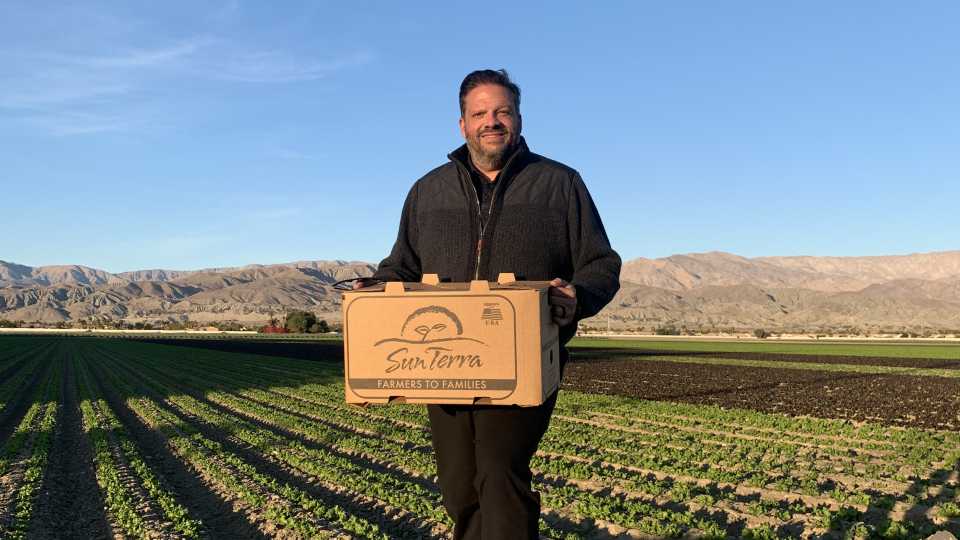Having Luck and Smarts Grow Well Together for This Produce Industry Player
The produce industry is comprised of some bright individuals, many of whom are rewarded on occasion for their brilliance. Steve Brazeel happens to be one of those people.
Brazeel, 52, has founded four companies — SunTerra Produce (2000), Prime Cooling (2012), Project FoodBox (2020), and Elevated Foods (2020). He also co-founded SunTerra Distribution (2015) and SunTerra Logistics (2021). Each of those California-based operations is very much alive and well as you read this.
SunTerra Produce started it all for Brazeel, growing from a one-person produce brokerage firm into an industry-leading, full-service platform. The Newport Beach firm handles sales, marketing, farming, food safety, harvesting, storage, and distribution activities for specialty crop producers on more than 5,000 acres throughout the U.S. and Mexico. Making waves two decades later now are Brazeel’s newest branded initiatives — Elevated Foods and Project FoodBox.
BIG MONEY
The USDA Partnerships for Climate-Smart Commodities program in October awarded Elevated Foods with a $20 million grant that will enable the company to fast-track its efforts to restore and regenerate agricultural lands while producing more nutrient-dense fruits and vegetables.
Over the next five years, Elevated Foods will support fruit and vegetable producers in implementing climate-smart production practices — measuring, monitoring, and verifying the carbon and greenhouse gas benefits associated with the implementation of these practices — and develop markets to promote fruit and vegetable crops as climate-smart commodities. In turn, a broad spectrum of customers and underserved communities will enjoy expanded access to healthy and nutritious foods.
“When we read the RFP (Request For Proposals) for the grant, we were pleasantly surprised to see the three pillars of their program, which are incentivize growers to adopt climate-smart practices, measure those outcomes so growers can showcase to their customers what they’re doing, and identify new markets for
these growers.
“We’re, like, ‘Hmmn, that sounds like you’re really familiar with what we’ve just been working on for the last two years.’ We couldn’t help ourselves but to send in an application, which took a ton of effort — 60 days, 12 hours a day, trying to figure out how to make sure our proposal stood out, because that program was extremely oversubscribed — tons of interest, an incredible amount of competition. We knew it was kind of a shot in the dark, but we were confident that our business model for Elevated Foods was literally in direct alignment with USDA’s vision.”
It wasn’t the first time the stars had aligned for Brazeel.

SunTerra Produce developed the carton held here by Steve Brazeel for the USDA Farmers to Family Food Box program.
Photo courtesy of SunTerra Produce
BANK ON IT
In April 2020, with the pandemic and its lockdowns gripping the country, USDA awarded SunTerra Produce $6.27 million to distribute family-sized boxes of fresh food to people in need. Unfortunately, the Farmers to Families Food Box (FFFB) Program ended on May 31, 2021. What could have been the end of Brazeel’s food bank experience was instead only the beginning.
“The Farmers to Families program was really game changing for SunTerra at a time when there was a lot of uncertainty. When that program ended, one of the good things that came out of it was TEFAP,” Brazeel says, referring to The Emergency Food Assistance Program. “It’s an emergency feeding program that’s been in existence for a very, very long time, and they had very limited fresh fruit and vegetable options before the Farmers to Families program.”
SunTerra soon won a bidding process to add its mixed fruit and vegetable boxes to the TEFAP menu. And then it got interesting, according to Brazeel.
“These food banks said, ‘Hey, we loved what you were doing and how you’ve gone over and above to provide super, high-quality fresh fruits and vegetables that are highly desired by our members. Is there a way we can purchase those out of our budget?’
“I didn’t really realize that food banks purchased things,” Brazeel says. “I didn’t have any kind of working knowledge about how they work. But they have a budget, and they buy a lot of shelf-stable items, and they have some really good farmer-donated produce initiatives.”
What they really enjoyed, though, were the fruit and vegetable boxes. And just like that, Project FoodBox had morphed into a branded initiative of SunTerra Produce. The company has since delivered more than a million boxes directly to food banks and 3.3 million boxes overall to communities. And it’s not just the food banks that are excited, Brazeel says.
“With all these awesome farmers we have along the West Coast, whether it’s California, Arizona, or even the potato and onion and apple people up in Washington, Oregon, and Idaho, we have a really good network of growers that are able to supply us with their over-produced items or ones that the market is really struggling with,” Brazeel says.
“New opportunities seem to present themselves in this field when you’re doing good. It seems that positive opportunities come your way, and that’s really been our experience with this program.”










